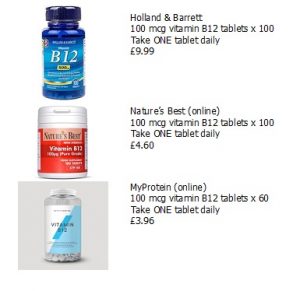You may be aware that during the Covid pandemic we have stopped giving vitamin B12 injections to minimise footfall into the Surgery.
As a Surgery we have been looking at the local and National guidance. You may have been told by your doctor that the only way to treat your low vitamin B12 is with an injection. This has been the medical belief in the UK for over 40 years.
As with all medical conditions new evidence comes to light. The view that has now been adopted by many countries is that taking oral vitamin B12 is, for the majority of situations, just as good as having an injection. Indeed, taking oral vitamin B12 every day may avoid the ups and downs patients can report when having an injection every three months.
Given this new evidence, the Surgery has decided to adopt these National guidelines. Only a few patients will continue to receive injections:
- those patients with neurological problems as a result of a B12 deficiency
- those patients who have had large parts of their stomach or small intestine removed
- those patients who have had a blood test which shows they are intrinsic factor positive.
The National guidance suggests that you should buy the tablets. The normal maintenance dose is 50 to 150 mcg of Cyanocobalamin. These tablets can be brought from pharmacies and health food shops.
Examples of Cyanocobalamin (B12) products available to purchase as an alternative to B12 injections
Please note that B12 supplements are classified as an over the counter medication. Therefore, we are not able to provide this on prescription.
Prices are correct as at the time of writing. Other products are available – please ask at your local Pharmacy.
We have already received a lot of telephone calls from patients about vitamin B12 injections. If you are unsure about whether or not you are eligible to have an injection, please submit your question via the eConsult section of this website, and your doctor will respond to you.
Thank you for your co-operation.
Frequently Asked Questions about Vitamin B12
I must have my B12 injection as I have a medical condition
After an initial course of B12 injections, most patients will have sufficient body stores of B12 to carry them through the challenging months ahead. Taking a high oral dose should keep your levels topped up.
I am at risk if I don’t get my B12 injection
Whilst many patients fear not having their B12 injection, it is clear that the threat of Covid 19 far exceeds any benefit a patient may feel they obtain from their injections, especially for patients at high risk of Covid related symptoms.
I need the injection as I have been told that I cannot absorb B12
Patients are almost all aware that B12 mainly gets into our body because of a “carrier” called intrinsic factor (IF). This IF binds to B12 and takes it into the blood. However, around 1% of vitamin B12 is absorbed passively without IF. Taking a high enough (more than 1000 mcg) oral dose would provide 10 mcgs of B12 absorbed passively, which exceeds the recommended daily requirement.
I have pernicious anaemia
This would have been treated meaning you no longer have pernicious anaemia. The 3 monthly injections are simply a precaution to stop this reoccurring. As stated, you should have sufficient levels and stores to take you through this difficult time. The British Society of Haematology suggests “initial treatment with oral Cobalamin may not be appropriate in pernicious anaemia, but may be considered in maintenance or correction of sub-optimal levels in asymptomatic patients”.
Only B12 injections have been proven to work
Historically injections have been used as the first line treatment/maintenance therapy. However, some countries now routinely use oral options instead and there is reasonable evidence to suggest this may be suitable for most patients.
Anecdotally, some patients have reported that a stable, daily oral dose of B12 helps to avoid the “peak and trough” phenomenon that many patients report following their B12 injection whereby they feel very well just after an injection and unwell in the weeks/days preceding their next.
